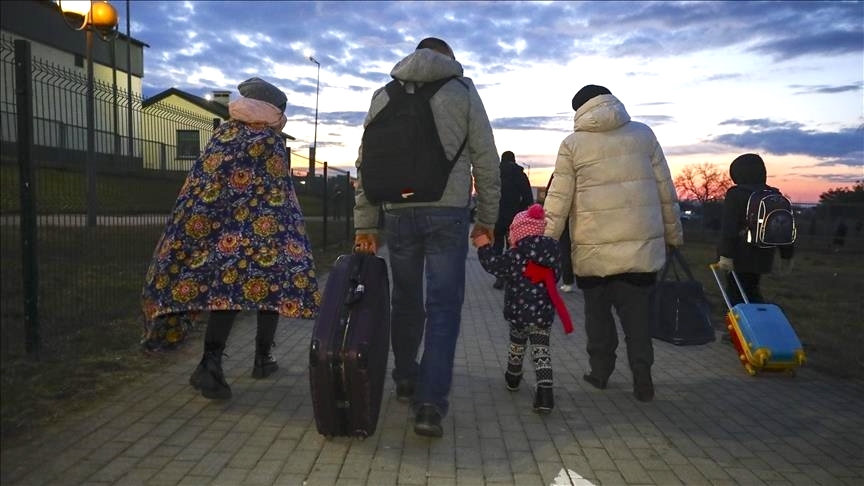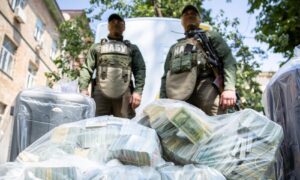When Ukrainian refugees started to arrive in Europe, there were a lot of women, because men over 18 and under 60 years old can’t leave Ukraine according to the martial law, apart from a few exceptions. So, it was women, children, and older people.
The world has never seen such refugees. Many arrived fashionably dressed and with expensive luggage. Some drove almost-new cars of expensive make. Most of the young women and many of the older ones were manicured, pedicured, had good haircuts and jewelry made of precious metals. A lot had iPhones or iPads, modern laptops or other high-tech items.
They didn’t look like refugees
They continued to look for the lifestyle they were accustomed to lead, even while many of them didn’t have anything but a change of clothes, and that one from a donation box. They wanted to find beauty services, childcare services and any kind of services with the same ease and cheapness that they had in Ukraine.
They were disappointed when it turned out that all those things were more expensive, more complicated, taking longer, or not available at all — in the countries which the new refugees were used to consider developed. They were quickly turning bitter or burned out, trying to make it in the completely new conditions.
I just can’t do it any more. Germany. Forced emigration after Russia started the war in Ukraine. Two children, pets. I feel bad. Very bad. And for every “bad” I have a counter-argument about how great I feel. But it does not work. Of course the important thing is that we’re alive and well. It’s just a fact I know. It doesn’t make my life any easier. The insurance company lost my paperwork. Oh, that’s okay. I sent new copies over today. But we’re going to be without insurance for another week. The kids are small and we’ve already been to the hospital once. We’re in a fucking village. A very beautiful, boring village. In some strange outhouse. At home I have my dream apartment with robot vacuum cleaners, dishwasher and washer and air conditioning. I see it in the evening light and wonder what else I would have added to it. I can’t learn German. Yes, I know that three months is not a deadline. But I don’t even have a good start. The kids are endlessly eating sweets and watching cartoons. God, at least let my health be okay. I’m looking for support, wondering what to make myself happy with. I can’t find anything [that would help]. At some point I realized I was starting to drink too much. I stopped buying alcohol. The house is a mess, the kids are on sweets. I don’t even have the strength to clean up. German homes are beautiful and expensive. I have a garage full of shit and no knowledge of the language. New acquaintances piss me off. Oh yes, I’m ungrateful. I don’t kiss hands for old donated jeans. Two of my new acquaintances, who originally had a good time [with me] and even became friends, have almost directly reproached me for not going to work and not paying taxes, and even daring to complain. Ah, sorry, only one, the other has disappeared and does not respond to messages. And yet at home I had a lot of friends, I chose with whom to communicate, where to go and such a situation could not happen in principle, the circle [of acquaintance] was carefully selected and I was interesting. And here I am, a woman with children and problematic, and ungrateful.
(From an anonymous post on Facebook.)
At the same time, the warm welcome and extensive help that Ukrainians got in Europe started raising questions UA has special treatment. It was not only about the other nationals fleeing Ukraine, but also about refugees from other countries who don’t seem to get this kind of “preferential treatment”. A lot of articles appeared, calling out a double standard and the Ukrainians privileged. The allegation was — and is — that the difference in treatment is a racial issue.
It even was supported by what some politicians said openly:
Bulgarian Prime Minister Kiril Petkov was one of the first public figures to explicitly differentiate between those fleeing Ukraine and those fleeing other countries. “These people are Europeans,” he said. “These people are intelligent, they are educated people. … This is not the refugee wave we have been used to, people we were not sure about their identity, people with unclear pasts, who could have been even terrorists.”
(From “The Ukrainian Refugee Crisis’ Double Standard” by Isabella Alexander-Nathani)
These accusations aren’t intended to make other countries close their borders to Ukrainians — rather, that they should open them for every other nationals in the same deplorable situation. However, they do have a side effect of creating resentment toward the fleeing Ukrainians, as using (or even abusing) the white privilege. Some people think of them as a kind of emigrants, who had it easy — too easy.
They are welcomed into people’s homes! Given visas everywhere! Given medical insurances and/or social benefits! They didn’t even have to earn it!
They forget one thing: these people didn’t ask for it
Most of the Ukrainians wanted only one thing: to live their own lives. To stay in their country, go to work, sit in a bar with a drink on a Friday afternoon. To fall asleep with their own partners, in their own beds, and walk their own dogs in the morning along the familiar streets. Now they find themselves in France, Italy or Germany, which never even entered their dreams, and all they want is their old life back.
Even if a refugee is young and has no health problems, they are no longer completely healthy after the experience. All the resources used to survive under extreme conditions have taken their toll, and as soon as a person finds themself in relatively safe conditions (that is, where there is no shooting), their health simply collapses.
That is why young people lose their teeth and hair, have problems with digestion, often due to unfamiliar and low-quality food, and the women experience problems with menstrual cycle.
Well, let them get treatment — one might say, because medical care in Europe is free for refugees. But alas, that’s easier said than done. No country health care system can cope with such an influx of people, some of which are seriously wounded.
Yes, if there is a critical injury, the medics will perform a surgery fairly quickly. Cancer patients are also likely to receive treatment quickly, but a lot depends on the country in question, the luck of the situation, and the persistence of volunteers. But if you’re not in the priority group, sit back, wait, get some fresh air or drink ginger tea. Got a toothache? Okay, there’s a dentist appointment in two months. Heartburn? Sorry, you can’t see a gastroenterologist until three months later.
All drugs usually require a prescription, and getting that prescription is a whole separate quest. Something can be handed out by volunteers, but most often these are cheaper analogues in miserable quantities. Some drugs can be paid for with your own money, but it is often lacking — the benefits are barely enough to exist.
Almost all refugees have a powerful PTSD, brought about or complicated by complete uncertainty and constant anxiety about their loved ones in Ukraine. As a rule, those are either men at the front lines or in captivity, or elderly people who did not want to leave. Many of the refugees have sleep disorders, panic attacks or other anxiety issues of varying severity, which no one treats. Why — see the above.
If this situation looks like a privilege to you, I advise you to think again
Of course everything in this world is relative. And it’s true that there’s a difference in how Europe accepts the Ukrainians now, compared to how it treated the refugees from other wars around the globe. But is there anyone who wants this kind of “privilege” and is prepared to leave their homeland for it, running away with barely a suitcase, pulling the kids out of schools and kindergartens, leaving sick and elderly behind, and not knowing whether they will ever see them, or their partners who could not leave?
Any takers?
Yeah. That’s what I thought.
Right now, almost seven months after the active phase of war started, there seems to be a big change. Ukraine, which until now seemed stuck in a positional war, is conducting a powerful counter-attack. And most of the Ukrainians are greedily catching up on the news from the front lines, any time they have a free minute.
They all have one thought, even if they don’t allow themselves to say this out loud, and try not to even think of it too much, lest that the hope will prove to be a false one.
We will soon go home.
Maryna is a software developer from Ukraine who now lives in Germany. Maryna also writes a programming blog to share her knowledge. She sometimes speaks at conferences, though being an introvert, writing comes more naturally. She says she’s not a professional writer but writing is something she likes, “and I think I can do it pretty well.”














